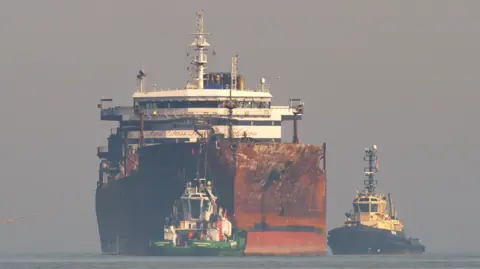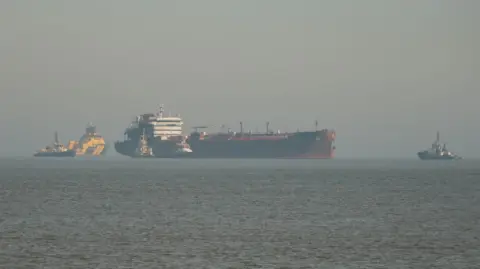Oil tanker arrives in port after North Sea crash
 PA Media
PA MediaAn oil tanker has arrived at a port for inspection a month after it was struck by a cargo vessel in the North Sea.
The Stena Immaculate oil tanker was towed into the Port of Great Yarmouth, Norfolk, on Friday after being anchored 16 miles (26km) off the coast.
The vessel, which was transporting jet fuel for the US military, had been travelling to Hull from a Greek port when it was struck by Portuguese-flagged Solong on 10 March.
On Thursday the coastguard said the boat had been successfully unloaded.
According to data on the ship-tracking site, Marine Traffic, the oil tanker was supported by five vessels including four tug boats and a fire-fighting vessel.
Richard Goffin, the port director at Peel Ports Great Yarmouth, said: "In partnership with the Department for Transport, the Maritime Coastguard Agency and the vessel owners, the Port of Great Yarmouth will welcome the MV Stena Immaculate into harbour in order for a necessary survey to take place.
"Duties of this matter are a routine operation for ports, salvage operators and other maritime companies across the globe and at all times, the Port of Great Yarmouth strictly adheres to UK safety regulations and international maritime standards."
 Qays Najm/BBC
Qays Najm/BBCThe Solong, which had been making its way to the Netherlands from Grangemouth, Scotland, arrived in Aberdeen on 28 March following a tug-assisted journey lasting several days.
Since the incident clean-up operations of plastic pellets, also known as "nurdles", have taken place between Old Hunstanton and Wells-next-the-Sea and other parts of The Wash in Norfolk.
The pellets were thought to have entered UK waters when the oil tanker was struck, with some of them moulding together when the two ships caught fire.
On Wednesday, King's Lynn and West Norfolk Borough Council said about 790,000 nurdles and burned fused nurdle mats had been recovered from beaches.
Follow Norfolk news on BBC Sounds, Facebook, Instagram and X.
